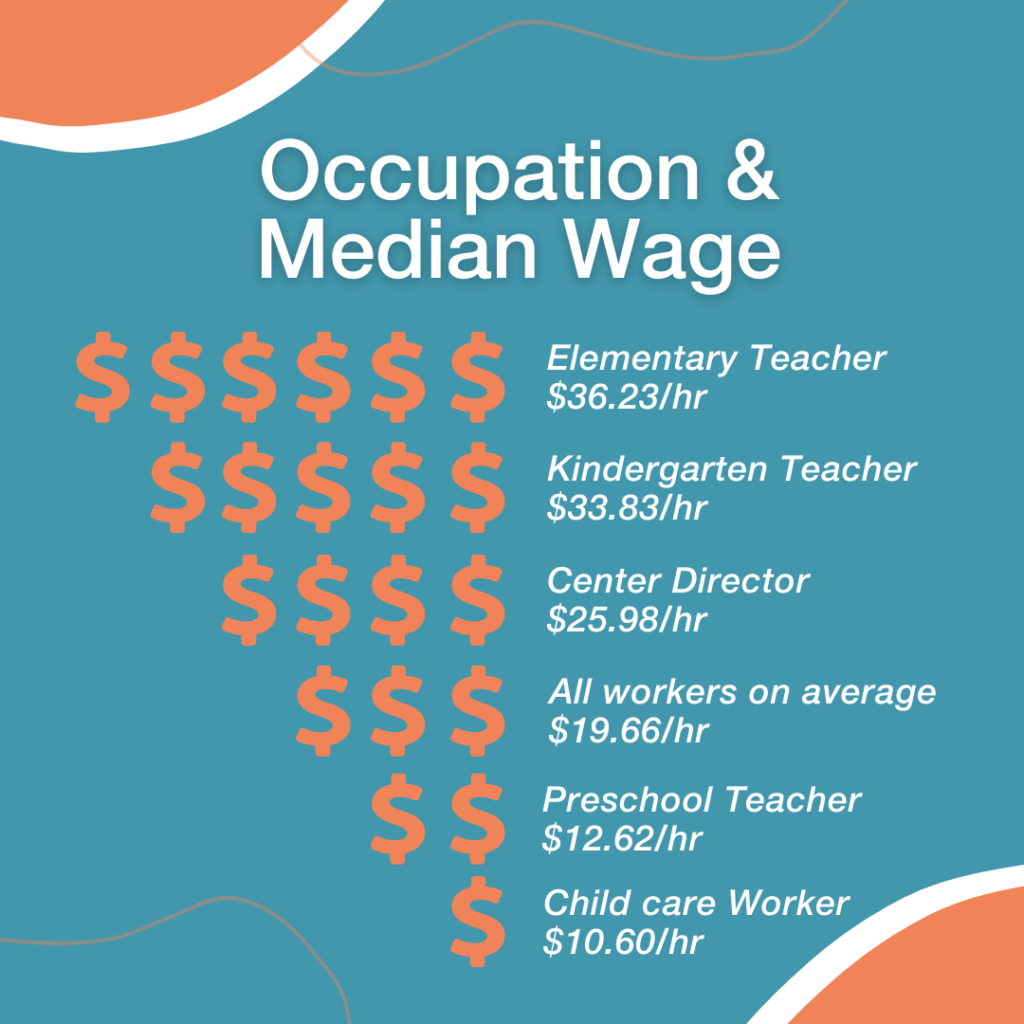Promising Signs Ahead for Early Learning Workforce
• A new Senate Resolution would create a targeted wage scale for early learning professionals—a crucial step to enact structural change and improve compensation for the early learning workforce.
• A targeted wage scale could provide guidance for Delaware on what the high-skill profession should earn.
• The child care industry faced a workforce crisis even before COVID-19.

Over the past year, the early childhood industry and workforce has plunged into crisis from the COVID-19 pandemic. As we wrote in March, the child care industry faced crisis conditions even before COVID-19 due to the poor compensation of early learning professionals and the negative impact it has on both educator wellbeing and the quality of early learning.
A target wage scale for early childhood educators, we wrote, could improve compensation and set a base salary for all workers. Establishing a compensation scale is also a critical first step to professionalizing the field and investing in a workforce that has long been overlooked and overworked. This month, a new resolution introduced in the State Senate aims to do just that.
The resolution, introduced by Sen. Kyle Evans Gay, directs the Delaware Department of Education (DDOE) and the Delaware Early Childhood Council (DECC) to create a state compensation scale for early child care educators by this October. The scale should address all child care educators (such as lead teachers, teaching aides, and directors) and include employment experience and common certifications that early childhood professionals receive.
The resolution also calls for the DDOE and DECC to establish a professional pathway consisting of college course and certification for early childhood educators that is linked to the wage scale. The idea is to help early childhood educators advance in their careers.
The resolution, nor the creation of a targeted wage scale, would not mandate providers to pay their employees a certain wage. It simply would set an aspirational target for the growing community of early child care advocates.
A statewide, targeted wage scale for early childhood professionals will bring the fair compensation the workforce so desperately deserves. It can also be used to help guide additional state investments in child care to ensure pay bumps for the early learning workforce reaches a living wage, on par with K-12 educators.
The resolution mentions that the wage scale can also be used to inform the cost of care estimator, an alternative method to the market rate study, to estimate the cost of providing child care in Delaware. The cost of care estimator can then be used to establish Purchase of Care rates for the state budget in future years.

Early Learning Educators are Woefully Underpaid
A targeted wage scale is crucial to not only provide fair compensation to a high-skill profession that deserves higher wages, but to begin to address wage disparities between early learning and K-12 educators. As of 2019, the average annual salary in Delaware for a pre-K teacher is $27,820. A kindergarten teacher and an elementary school teacher each make more than double that amount, earning an average annual salary of $61,040 and $63,970, respectively. Additionally, many early learning professionals in Delaware have no benefits and have to maintain a second job to make ends meet. More specifically:
- Only 40 percent of early learning professionals in Delaware have healthcare benefits. Many miss out on other benefits, such as planning time and paid time off, unlike their K-12 counterparts.
- As of 2020, the average wage in Delaware for a pre-K teacher is $12.62. For a child care worker, the average wage is $10.60. A 2016 report showed that 75 percent of early childhood professionals receive an hourly wage instead of a salary with benefits.
- Without a livable wage and benefits, many child care workers have to maintain a second job to supplement their income, which includes about 13 percent of child care workers in Delaware
Disparities in pay between early learning professionals and their K-12 counterparts is also structural. Salaries for K-12 public school teachers in Delaware are already rooted in a wage scale, or pay schedule, that sets a base salary for all educators. This scale serves as an incentive for educators to increase their level of educational attainment as they increase their years of experience.
Currently, no such scale or incentive exists for pre-K or early learning professionals statewide.
In Delaware, there is no base, or starting salary for early learning professionals and no career pathway with financial incentives to increase their level of education along stackable credits, credentials, and experience—a model several other states have created.
Action in Other States
Some states, either through legislative action or through taskforces, have proposed targeted wage scales for the early learning workforce. Some states have worked on proposals to establish a targeted wage scale, while others have worked to create a more comprehensive look at the issue through additional policy initiatives. Examples include:
In Delaware, it’s an issue that’s long overdue. Stay tuned to this blog for continued updates.
Related Topics: Delaware education, early child care, early learning workforce, legislation, wage scale